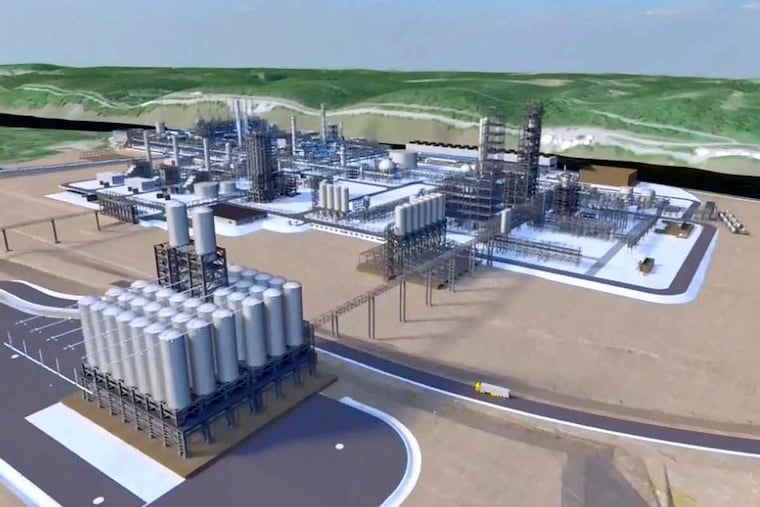Shell gives green light to giant Pennsylvania ethane cracker plant
Shell Chemical Appalachia announced Tuesday that it will move forward with construction of a long-awaited multibillion-dollar petrochemical plant in Western Pennsylvania that business and political leaders say will transform the state's shale-gas industry.

Shell Chemical Appalachia announced Tuesday that it will move forward with construction of a long-awaited multibillion-dollar petrochemical plant in Western Pennsylvania that business and political leaders say will transform the state's shale-gas industry.
Construction of the giant polyethylene complex on the site of a former zinc smelter in Beaver County will create up to 6,000 construction jobs and 600 permanent jobs when it is completed in the next decade, the company said.
The plant represents the kind of major downstream economic development envisioned when the state welcomed shale gas development.
Pennsylvania officials courted Shell for more than four years to build the ethane cracker, which produces a raw material used in an array of chemical and plastic products. The state legislature in 2012 agreed to give an ethane cracker $1.65 billion in tax credits over 25 years in the hope that a plant would become a catalyst for a manufacturing renaissance.
"This is not just another company that is bringing 'X' number of jobs to Pennsylvania," Gov. Wolf said in an interview Tuesday. "This is actually something that is creating a foundation for a whole new set of manufacturing products."
The Shell plant will require a daily diet of 105,000 barrels of ethane, one of the family of natural gas liquids - including propane and butane - that are produced in the "wet" gas areas of the Marcellus Shale in southwestern Pennsylvania, as well as the Utica Shale in Ohio and West Virginia.
Natural gas liquids like ethane are now being shipped out of the Marcellus by pipelines to plants on the Gulf Coast, Canada, and also to Marcus Hook, where Sunoco Logistics Partners is loading the material on ships for export to European crackers.
Shale-gas producing states have labored to convince manufacturers to build local plants to retain some of value-added production. Wolf credited the Corbett administration with targeting Shell and sponsoring the tax break.
"They were asking a big company like Shell to take a fresh look at this industry and what it could be, not what it is," Wolf said. "My administration's job was to keep making that point."
The ethane cracker, which breaks down or "cracks" large molecules into smaller ones, will produce 1.5 million metric tons of ethylene a year. Shell also will build three other manufacturing units to convert the ethylene into polyethylene pellets, a common form of plastic.
Shell would not disclose the project's price. Sasol, a South African petrochemical company, is building a similar-sized cracker in Lake Charles, La., along with six manufacturing units, for $11 billion.
"This is so huge, it's going to manifest itself in ways we can't envision right now," said David N. Taylor, president of the Pennsylvania Manufacturers' Association.
Shell said the plant's location - within 700 miles of more than 70 percent of North American polyethylene customers - was a deciding factor. As the only plant in the east, Shell could have a logistical advantage over Gulf Coast competitors.
Shell Chemicals announced in 2012 it had identified the 340-acre former Horsehead zinc plant site on the Ohio River, but delayed making a final investment decision while it studied its options. It has committed more than $100 million to buying and cleaning up the site, near Monaca.
Similar projects have been delayed or canceled in the last year because of the plunge in oil and commodity prices.
"Shell's decision to move forward with this world-class facility, which will put thousands to work across our region through utilizing clean-burning domestic natural gas for decades to come, is welcomed news, especially given the challenging market conditions," said David Spigelmyer, president of the Marcellus Shale Coalition.
Shell's ethane cracker, whose energy needs are so great it will require its own power plant, will become a major source of air pollution, a sore point with environmentalists.
The Clean Air Council appealed state permits issued last year that do not require Shell to install air monitors at the plant's perimeter. "Shell has even installed fence-line monitoring at other facilities it operates, but has so far refused to use it at the proposed cracker facility here in Pennsylvania," said Joseph Otis Minott, the council's executive director.
The governor said Shell would do the right thing.
"They're not in this to do something in the short run," Wolf said. "They're making a long-term commitment to Pennsylvania. I think they are as aware and as sensitive to the environmental concern as anybody is in Pennsylvania."
215-854-2947 @maykuth